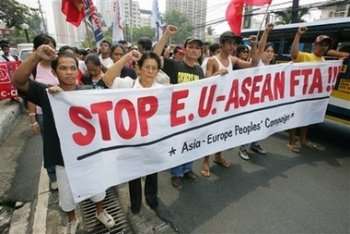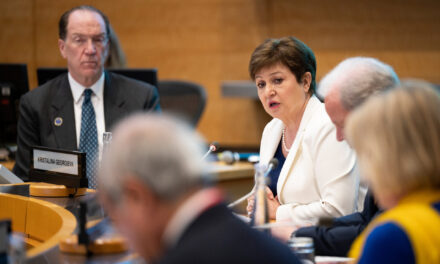In Louella D. Desidero’s article, “Phl to open more bilateral agreements,” published in the Philippine Star on 22 September 2014, Trade Undersecretary Adrian Cristobal, Jr. was quoted expressing the government’s interest in “exploring more bilateral FTAs” after “the usual consultations and impact studies.”
The article also mentioned the possible launch of two negotiations for free trade agreements with European countries, one with the European Union, and another with the European Free Trade Association (EFTA), which includes Iceland, Liechtenstein, Norway and Switzerland.
The EU-ASEAN FTA Network has been monitoring these developments since 2007 when the EU, as part of what it called “New Partnerships with Asia,” launched simultaneous trade talks with Korea, India and ASEAN. The regional negotiations with ASEAN broke down in 2009, prompting the EU to take the bilateral route to further its trade agenda.
It is important to highlight the real nature of these FTAs and the dangers they pose to jobs and livelihoods, people’s health and access to medicines, as well as the broader issue of policy space.
While the actual texts of the proposed agreements with the Philippines are still subject to, as Usec. Cristobal reported, a process that includes scoping exercises between the parties, it is safe to assume that they will be cut from the same cloth as the other EU FTAs. This means they will resemble existing agreements with Korea, Singapore and more recently Canada, and those that are still being negotiated, like the mega-regional deal called the Trans Atlantic Trade and Investment Partnership Agreement (TTIP) between two major trade powers: the United States and the EU.
These agreements are called “New Generation FTAs,” and here lies the danger for the Philippines: they go well beyond the commitment to reduce tariffs on goods and services. They go beyond commitments already made under the World Trade Organisation on Intellectual Property Rights under the TRIPS agreement. They even guarantee the right of corporations to sue governments over public policies that are deemed detrimental to corporate profits.
One of the most contentious elements of these agreements is the investment chapter, which includes an investor-to-state dispute settlement mechanism (ISDS) which allows corporations to make million-dollar claims against governments under international investment tribunals like the World Bank’s International Centre for the Settlement of Investment Disputes (ICSID) and the UN Commission on International Trade Law (UNCITRAL).
The Philippines is no stranger to these multi-million-dollar investment suits. There are two pending cases against the Philippines under ICSID, both involving EU corporations. The first is the $425-million claim by the German contractor Fraport over the cancellation of the contract to build the NAIA terminal 3. More recently, a case was brought by the Belgian company Baggerwerken Decloedt En Zoon NV over the cancellation of the dredging project in Laguna de Bay in 2011. Both these cases cite as their basis the Philippines bilateral investment treaties with Germany and Belgium, respectively, which contain the ISDS provision.
Another serious issue that is conveniently left out in statements from government about these FTAs is the impact of these agreements on public health and access to medicines. A distinct feature of the “New Generation FTAs” which we expect would be in the EU FTA is the rigid protection of intellectual property rights (IPR). These agreements contain provisions that would effectively undermine the Cheaper Medicines Law and delay the availability of more affordable life-saving medicines. We should be pursuing more protections for our citizens, and especially the poor and marginalized, not corporations and their profits.
These are just some of the concerns that should be raised in the process of consultation and impact assessment that Usec. Cristobal alluded to. We hope that the Trade department would really engage in an honest and transparent assessment of the country’s policy with regard to trade and investment agreements.








